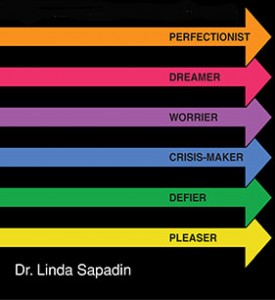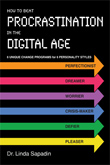by Dr. Linda Sapadin
 PROCRASTINATING
PROCRASTINATING
in the Digital Age
PEOPLE HAVE STRUGGLED WITH procrastination since the beginning of time. Let’s see, shall I spend the evening doing mind-numbing clean-up chores or enjoy a good time with my friends? Shall I do tedious and tiresome paperwork or plop down on the couch and watch a movie? It’s never been easy to control our impulses and urges, especially when the “correct” choice goes against our grain.
In the modern world, however, procrastination is even harder to conquer. Accessible, appealing, addictive distractions are everywhere. Beepers beckon. Diversions call. Entertainment entices. Digital devices ding. Add up the hours you spend on stuff that has nothing to do with your personal or career goals. Now, is it any wonder that you’re teetering on the edge of the Boulevard of Broken Dreams?
Though there were (and are) plenty of pre-digital ways to fritter away your time, digital temptations are just so much easier, enjoyable and seductive. Sure you could always neglect your chores to take a snooze or flip through a magazine or actually read a book. But how can you compare those distractions with the ones currently available to us?
Exciting, fast-paced entertainment has actually changed the way your brain operates. Your gray matter now craves excitement. If a task doesn’t immediately hold your interest, your mind gravitates to other matters as your accomplishments gravitate downhill. Don’t live one more day regretting how you spend your time. You deserve better. You can do better. This book will show you how.
One Size Does Not Fit All
All procrastination styles are not the same. If you’ve tried to curtail your pattern but haven’t been successful, it could be that you haven’t found the right approach. If it were a simple matter, like “making resolutions ” or “just doing it,” don’t you think your mom’s nagging or your teacher’s scolding would have cured you of it years ago? Most how-to advice highlights developing better organizational skills and increased discipline. Those are good skills to learn; but they’re not enough. Why not? Because many habits—including procrastination—are driven by subconscious personality traits and emotional needs.
Whatever self-defeating pattern of behavior you want to conquer, you must know your personality style. This is essential, as the right advice for one style is the wrong advice for another. One change program does not fit all. Two examples:
If your procrastination is driven by a perpetual pursuit of perfection, it’s essential that you pay less attention to details. Putting too much emphasis on the details inhibits your ability to complete your work. Why? Because if you believe your work isn’t perfect, you’ll never want to wrap it up and call it a day.
However, if your procrastination is driven by a perpetual pursuit of pie-in-the-sky dreams, it’s essential that you pay more attention to details. Not enough emphasis on the details will thwart your progress. Why? Because though you may have spectacular ideas, your ideas will never come to fruition when you neglect doing the details.
Because procrastination is not fueled by the same reasons, I describe 6 personality styles and provide you with a change program tailor-made for each style. The change programs are not designed to turn you into a rigid, clock-driven, no-fun person. The opposite, however, is also true. I’m not suggesting you live the life of an unstructured, spur-of-the-moment, follow-your-impulse person.
You may question: Why not? Why can’t I live in the moment, doing only what I feel like doing? The short answer: Because a funny thing happens when you’re working at a job, involved in a relationship or simply trying to create a life for yourself. People expect you to take care of responsibilities. And when you don’t, when you’re late or when you do a half-assed job, stuff happens. Unpleasant stuff! So what’s the goal? In one word: BALANCE
And, if there’s one thing that can throw you off balance, it’s procrastination. With so many seductive distractions, it’s tough to maintain a balanced life in the digital age. And yet, you can break the pattern. Indeed, you need to break the pattern. For the consequences become increasingly severe as time goes on.
You talk your way into a dream job—only to be fired when they notice your less than sterling work habits.
You have bills to pay—only you delay doing it and next thing you know the collection agency is on your back.
You have every intention of revising your resume—only you neglect to do so and are still stuck in a boring dead-end job.
You want to feel closer to that special someone—only you put off addressing the conflicts and now the relationship is in jeopardy.
Yes, procrastination can have many negative unforeseen effects. So, kudos to you for deciding to squash your debilitating habit before it squashes your future.
In the next chapter, you will find a self-assessment quiz to help you determine which of the six styles is yours. Know that each style has its splendid strengths and its wavering weaknesses. The goal of each change program is not to change you into another type of personality. That would be counterproductive and frankly, rather insulting. Yes, it might be helpful if you were better organized like your sibling or more detail oriented like your friend—but you’ve got admirable traits that they don’t have. Whatever your style, there’s no need for a personality makeover; the change program for each style works with you—helping you to nurture and sustain your best self.





Dr. Linda Sapadin,
I just ordered and payed for a digital copy of your book and I am not sure how to read it. I did not receive any emails regarding the book, only a receipt from my paypal account showing that I paid for it. Any help would be appreciated.